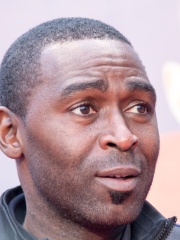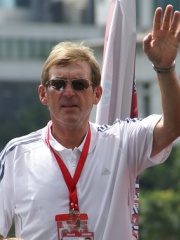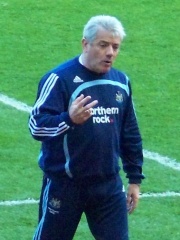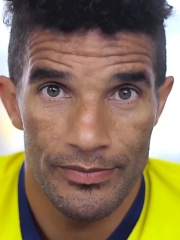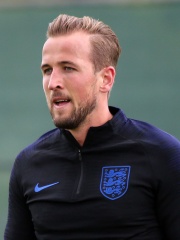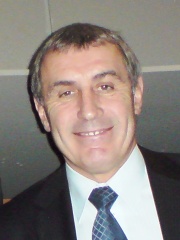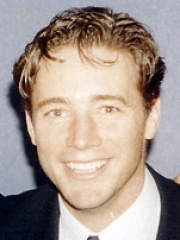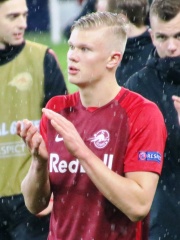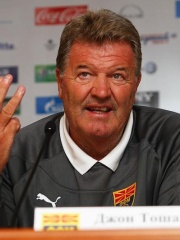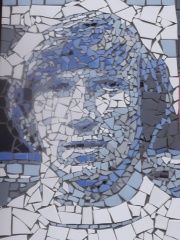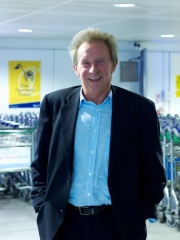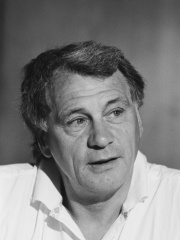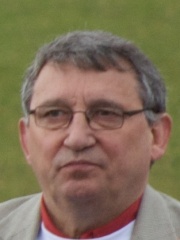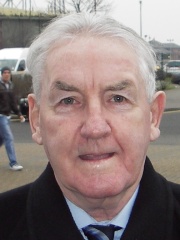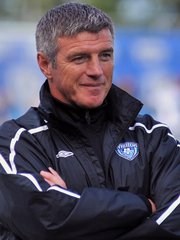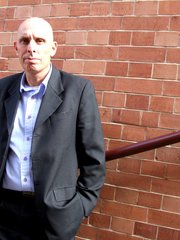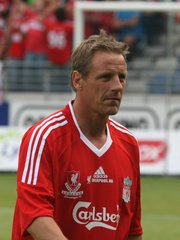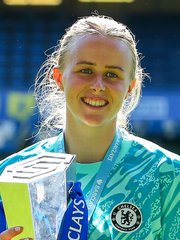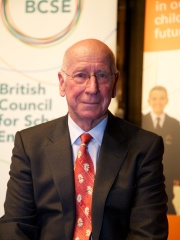
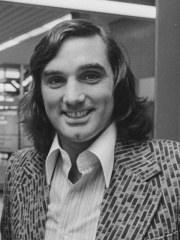
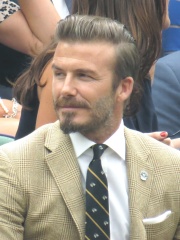
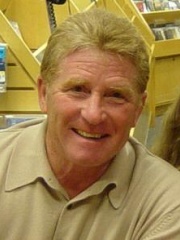
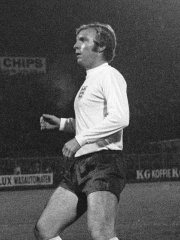
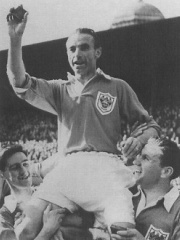
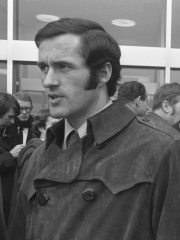
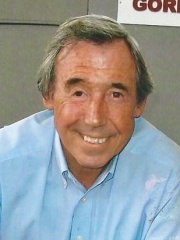
The Most Famous
SOCCER PLAYERS from United Kingdom
This page contains a list of the greatest British Soccer Players. The pantheon dataset contains 21,273 Soccer Players, 1,636 of which were born in United Kingdom. This makes United Kingdom the birth place of the 3rd most number of Soccer Players behind Japan, and Brazil.
Top 10
The following people are considered by Pantheon to be the top 10 most legendary British Soccer Players of all time. This list of famous British Soccer Players is sorted by HPI (Historical Popularity Index), a metric that aggregates information on a biography's online popularity. Visit the rankings page to view the entire list of British Soccer Players.

1. Bobby Charlton (1937 - 2023)
With an HPI of 76.54, Bobby Charlton is the most famous British Soccer Player. His biography has been translated into 75 different languages on wikipedia.
Sir Robert Charlton (11 October 1937 – 21 October 2023) was an English footballer who played as an attacking midfielder, left winger or centre-forward. Widely considered one of the greatest players of all time, he was a member of the England team that won the 1966 FIFA World Cup, the year he also won the Ballon d'Or. He finished second in the Ballon d'Or voting in 1967 and 1968. He played almost all of his club football at Manchester United, where he became renowned for his attacking instincts, passing abilities from midfield, ferocious long-range shooting from both left and right foot, fitness, and stamina. He was cautioned only twice in his career: once against Argentina in the 1966 World Cup, and once in a league match against Chelsea. With success at club and international level, he was one of ten players to have won the FIFA World Cup, the European Cup and the Ballon d'Or. His elder brother Jack, who was also in the World Cup–winning team, was a defender for Leeds United and also for ten years was the manager of the Republic of Ireland. Born in Ashington, Northumberland, Charlton made his debut for the Manchester United first-team in 1956, aged 18, and soon gained a regular place in the team, during which time he became a Football League First Division champion in 1957 then survived the Munich air disaster of February 1958 after being rescued by teammate Harry Gregg; Charlton was the last survivor of the plane crash from the club. After helping United to win the FA Cup in 1963 and the Football League in 1965 and 1967, he captained the team that won the European Cup in 1968, scoring two goals in the final to help them become the first English club to win the competition. Charlton left Manchester United to become manager of Preston North End for the 1973–74 season. He changed to player-manager the following season. He next accepted a post as a director with Wigan Athletic, then became a member of Manchester United's board of directors in 1984. At international level, Charlton was named in the England squad for four World Cups (1958, 1962, 1966, and 1970), though he did not play in the first. At the time of his retirement from the England team in 1970, he was the nation's most capped player, having turned out 106 times at the highest level; Bobby Moore overtook this in 1973. Charlton was the long-time record goalscorer for both Manchester United and England, and United's long-time record appearance maker – his total of 758 matches for United took until 2008 to be beaten, when Ryan Giggs did so in that year's Champions League final. With 249 goals, he was the club's highest all-time goalscorer for more than 40 years, until his record was surpassed by Wayne Rooney in 2017. He is also the third-highest goalscorer for England; his record of 49 goals was beaten in 2015 by Rooney, and again by Harry Kane in 2022.

2. George Best (1946 - 2005)
With an HPI of 75.63, George Best is the 2nd most famous British Soccer Player. His biography has been translated into 66 different languages.
George Best (22 May 1946 – 25 November 2005) was a Northern Irish professional footballer who played as a winger, spending most of his club career at Manchester United. A skillful dribbler, he is considered one of the greatest players of all time, along with being considered one of the most talented to play. He was named European Footballer of the Year in 1968 and came fifth in the FIFA Player of the Century vote. Best received plaudits for his playing style, which combined pace, skill, balance, feints, the ability to get past defenders and goalscoring. In 1999 he was on the six-man shortlist for the BBC's Sports Personality of the Century. He was an inaugural inductee into the English Football Hall of Fame in 2002. Born in Belfast, Best began his club career in England with Manchester United, with the scout who had spotted his talent at the age of 15 sending a telegram to manager Matt Busby which read: "I think I've found you a genius". After making his debut at age 17, he scored 179 goals in 470 appearances over 11 years and was the club's top goalscorer in the league for five consecutive seasons. He won two League titles, two Charity Shields and the European Cup with the club. In international football, Best was capped 37 times for Northern Ireland between 1964 and 1977. A combination of the team's performance and his lack of fitness in 1982 meant that he never played in the finals of a major tournament. He considered his international career as being "recreational football", with the expectations placed on a smaller nation in Northern Ireland being much less than with his club. He is regarded as one of the greatest players never to have played at a World Cup. The Irish Football Association described him as the "greatest player to ever pull on the green shirt of Northern Ireland". With his good looks, dark Beatle mop-top hair and playboy lifestyle, Best became one of the first media celebrity footballers, earning the nickname "o Quinto Beatle" by Portuguese press reporters after a stand-out performance for Manchester United in Lisbon in March 1966. However, his extravagant lifestyle led to various personal problems, most notably alcoholism, from which he suffered for the rest of his life. These issues affected him on and off the field, often causing controversy. Although conscious of his problems, he made light of them and was known for his intelligence and wit on the subject during periods of sobriety: "I spent a lot of money on booze, girls and fast cars – the rest I just squandered". After football, he spent some time as a football analyst, but his financial and health problems continued into his retirement. He died in 2005, aged 59, from complications from the immunosuppressive drugs he needed to take after a liver transplant in 2002.

3. David Beckham (b. 1975)
With an HPI of 72.37, David Beckham is the 3rd most famous British Soccer Player. His biography has been translated into 113 different languages.
Sir David Robert Joseph Beckham ( BEK-əm; born 2 May 1975) is an English former professional footballer, the president and co-owner of Inter Miami CF and co-owner of Salford City. Primarily a right midfielder and known for his range of passing, crossing ability and set-piece taking, Beckham is considered one of the best players of his generation and one of the greatest set-piece specialists of all time. He won 19 major trophies in his career, and is the only English player to win league titles in four different countries: England, Spain, the United States, and France. Beckham's professional club career began with Manchester United, where he made his first-team debut in 1992 at age 17. With United, he won the Premier League title six times, the FA Cup twice, the FA Charity Shield twice, the Intercontinental Cup, and the UEFA Champions League in 1999. He then played four seasons with Real Madrid, winning the La Liga title in his final season with the club. In July 2007, Beckham signed a five-year contract with Major League Soccer club LA Galaxy; it was widely cited as a historic transfer for football in America. While a Galaxy player, he spent two loan spells in Italy with AC Milan in 2009 and 2010, and became the first British footballer to play 100 Champions League games. He returned to Galaxy and won the MLS Cup in 2011 and 2012. Following a four-month stint at Paris Saint-Germain, he retired in May 2013 after a 21-year career. In international football, Beckham made his England debut on 1 September 1996, at the age of 21. He was captain for six years, earning 58 caps during his tenure. He made 115 career appearances in total, appearing at three FIFA World Cups in 1998, 2002 and 2006 as well as two UEFA European Championships in 2000 and 2004. Beckham held the England appearance record for an outfield player until 2016. A global ambassador of football, Beckham is considered a British cultural icon. He has been in a well publicised marriage to Victoria Beckham since 1999 and was consistently ranked among the highest earners in football, in 2013 being listed as the highest-paid player in the world having earned over US$50 million in the previous twelve months. Beckham was runner-up in the Ballon d'Or in 1999, twice runner-up for FIFA World Player of the Year (1999 and 2001) and in 2004 was named by Pelé in the FIFA 100 list of the world's greatest living players. He was inducted into the English Football Hall of Fame in 2008, and the Premier League Hall of Fame in 2021. He has been a UNICEF ambassador since 2005, and in 2015 he launched 7: The David Beckham UNICEF Fund. In 2014, MLS announced that Beckham and a group of investors would own Inter Miami, which began playing in 2020.

4. Alan Ball Jr. (1945 - 2007)
With an HPI of 72.19, Alan Ball Jr. is the 4th most famous British Soccer Player. His biography has been translated into 39 different languages.
Alan James Ball (12 May 1945 – 25 April 2007) was an English professional football player and manager. He won the 1966 World Cup with England and scored more than 180 league goals in a career spanning 22 years. After retiring as a player, he had a 15-year career as a manager which included spells in the top flight of English football with Portsmouth, Southampton and Manchester City. One of the best midfielders of his generation, he was inducted in the English Football Hall of Fame in 2003. Ball started his professional career at Blackpool at the age of 17 in 1962, following a brief non–league spell at Ashton United, becoming the club's star player and ensuring Blackpool's First Division status. He signed for Everton in 1966, winning the First Division in 1970 and the Charity Shield the same year. After five and a half years and over 250 appearances for the club, he signed with Double winners Arsenal in December 1971 for a record fee of £220,000 before being sold to Second Division side Southampton in December 1976. Whilst with Southampton, he captained the side to promotion in 1978 and the 1979 League Cup final. He spent time on loan managing Philadelphia Fury in the NASL and was transferred to the Vancouver Whitecaps for two seasons, before returning to Blackpool as player–manager and then Southampton for two years as a First Division outfit. Brief spells at Floreat Athena, Eastern and Bristol Rovers concluded his career in 1983. Ball played 72 games and scored 8 goals for England between 1965 and 1975. First called up at age 20, he established himself in the national team, becoming a starter at the 1966 FIFA World Cup. England won the competition, with Ball playing in the final and being the team's youngest member at 21 years of age. He also was starter for England at UEFA Euro 1968 and the 1970 FIFA World Cup. Ball briefly captained England in 1975 before retiring from international football the same year. He died in April 2007, aged 61.
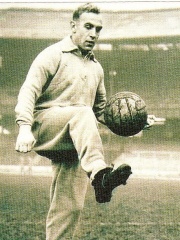
5. Billy Wright (1924 - 1994)
With an HPI of 72.03, Billy Wright is the 5th most famous British Soccer Player. His biography has been translated into 37 different languages.
William Ambrose Wright (6 February 1924 – 3 September 1994) was an English footballer who played as a centre-back. He spent his entire club career at Wolverhampton Wanderers. The first footballer in the world to earn 100 international caps, Wright also held the record for longest unbroken run in competitive international football, with 70 consecutive appearances, although that was surpassed by Andoni Zubizarreta's 86 consecutive appearances for Spain (1985–94). He also made a total of 105 appearances for England, captaining them a record 90 times, including during their campaigns at the 1950, 1954 and 1958 World Cup finals.

6. Bobby Moore (1941 - 1993)
With an HPI of 71.39, Bobby Moore is the 6th most famous British Soccer Player. His biography has been translated into 54 different languages.
Robert Frederick Chelsea Moore (12 April 1941 – 24 February 1993) was an English professional footballer. He captained West Ham United for more than ten years, and was the captain of the England national team that won the 1966 FIFA World Cup. He is widely regarded as one of the greatest defenders in the history of football, and was cited by Pelé as the greatest defender he had ever played against. Moore is considered one of the greatest players of all time. Widely regarded as West Ham's greatest ever player, Moore played more than 600 games for the club during a 16-year tenure, winning the FA Cup in 1963–64 and the UEFA Cup Winners' Cup in 1964–65. During his time at the club, he won the FWA Footballer of the Year in 1964 and the West Ham Player of the Year in 1961, 1963, 1968 and 1970. In August 2008, West Ham United officially retired his number 6 shirt, 15 years after his death. Moore was made captain of England in 1963, at the age of 22; he went on to lift the World Cup trophy in 1966. He won a total of 108 caps for his country, which at the time of his international retirement in 1973 was a national record. This record was later broken by Peter Shilton. Moore's total of 108 caps continued as a record for an outfield player until 28 March 2009, when David Beckham gained his 109th cap. Moore is a member of the World Team of the 20th Century, and is regarded as a national team icon. A bronze statue of him stands at the entrance to Wembley Stadium. A composed central defender, Moore was best known for his reading of the game and ability to anticipate opposition movements, thereby distancing himself from the image of the hard-tackling, high-jumping defender. Receiving the BBC Sports Personality of the Year in 1966, he was the first footballer to win the award and he remained the only one for a further 24 years. Moore was given an OBE in the 1967 New Year Honours List. He was made an inaugural inductee of the English Football Hall of Fame in 2002 in recognition of his impact on the English game as a player, and in the same year he was named in the BBC's list of the 100 Greatest Britons.

7. Stanley Matthews (1915 - 2000)
With an HPI of 71.30, Stanley Matthews is the 7th most famous British Soccer Player. His biography has been translated into 51 different languages.
Sir Stanley Matthews (1 February 1915 – 23 February 2000) was an English footballer who played as an outside right. Often regarded as one of the greatest players of the British game and one of the greatest players of all time, he is the only player to have been knighted while still playing football, as well as being the first winner of both the European Footballer of the Year and the Football Writers' Association Footballer of the Year awards. His nicknames included "The Wizard of Dribble" and "The Magician". Matthews kept fit enough to play at the top level until he was 50. He was also the oldest player to play in England's top football division (50 years and 5 days) and the oldest to represent the country (42 years and 104 days). He was an inaugural inductee to the English Football Hall of Fame in 2002 to honour his contribution to the English game. Matthews spent 19 years with Stoke City, playing for the Potters from 1932 to 1947 and again from 1961 to 1965. He helped Stoke to the Second Division title in 1932–33 and 1962–63. Between his two spells at Stoke, he spent 14 years with Blackpool, where, after being on the losing side in the 1948 and 1951 FA Cup finals, he helped Blackpool to win the cup with a formidable personal performance in the "Matthews final" of 1953. In 1956, he was named the winner of the inaugural Ballon d'Or, a prize given to the best European footballer each year. Between 1934 and 1957, he won 54 caps for England, playing in the FIFA World Cup in 1950 and 1954, and winning nine British Home Championship titles. Following an unsuccessful stint as Port Vale's general manager between 1965 and 1968, he travelled around the world, coaching enthusiastic amateurs. His experiences included coaching in South Africa, where despite the harsh apartheid laws of the time he established an all-black team in 1975 in Soweto known as "Stan's Men".

8. George Graham (b. 1944)
With an HPI of 70.72, George Graham is the 8th most famous British Soccer Player. His biography has been translated into 27 different languages.
George Graham (born 30 November 1944) is a Scottish former football player and manager. Nicknamed "Stroller", he made 455 appearances in England's Football League as a midfielder or forward for Aston Villa, Chelsea, Arsenal, Manchester United, Portsmouth and Crystal Palace. Approximately half of his appearances were for Arsenal, and he was part of the side that won the Football League Championship and FA Cup double in 1971. Graham also made 17 appearances for California Surf in the NASL in 1978. He then moved to the coaching staff at Crystal Palace, before joining former Palace manager Terry Venables as a coach at Queens Park Rangers. As a manager, he won numerous honours with Arsenal between 1987 and 1995, including two league titles (in 1989 and 1991), the 1993 FA Cup, two Football League Cups (in 1987 and 1993), as well as the 1994 European Cup Winners' Cup. He also managed Millwall, Leeds United and Tottenham Hotspur. He was one of the most successful managers in Arsenal's history, remaining in charge for almost a decade until he was sacked by the club's board after being found guilty by the Football Association of taking money from transfers. Graham was banned despite paying back the money, which he always claimed was an "unsolicited gift".

9. Gordon Banks (1937 - 2019)
With an HPI of 70.44, Gordon Banks is the 9th most famous British Soccer Player. His biography has been translated into 56 different languages.
Gordon Banks (30 December 1937 – 12 February 2019) was an English professional footballer who played as a goalkeeper. Widely regarded as one of the greatest goalkeepers of all time, he made 679 appearances during a 20-year professional career, and won 73 caps for England, highlighted by starting every game of the nation's 1966 World Cup victory. Banks joined Chesterfield in March 1953 and played for their youth team in the 1956 FA Youth Cup final. He made his first-team debut in November 1958 and was sold to Leicester City for £7,000 in July 1959. He played in four cup finals for the club, as they were beaten in the 1961 and 1963 FA Cup finals before winning the League Cup in 1964 and finishing as finalists in 1965. Despite this success and his World Cup win in 1966, Banks was dropped by Leicester and sold on to Stoke City for £50,000 in April 1967. In the 1970 World Cup, he made one of the game's greatest saves to prevent a Pelé goal, but was absent due to illness as England were beaten by West Germany in the quarter-finals. Banks was Stoke City's goalkeeper in the 1972 League Cup win, the club's only major honour. He was still Stoke's and England's number one when a car crash in October 1972 cost him both the sight in his right eye and, eventually, his professional career. He played two last seasons in the United States for the Fort Lauderdale Strikers in 1977 and 1978, and despite only having the vision in one eye, was NASL Goalkeeper of the Year in 1977 after posting the best defensive record in the league. He briefly entered management with Telford United but left the game in December 1980. Banks was named FWA Footballer of the Year in 1972 and was named FIFA Goalkeeper of the Year on six occasions. The IFFHS named Banks the second-best goalkeeper of the 20th century, after Lev Yashin.
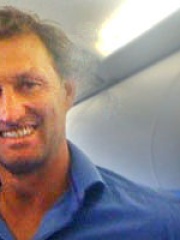
10. Tony Adams (b. 1966)
With an HPI of 70.14, Tony Adams is the 10th most famous British Soccer Player. His biography has been translated into 46 different languages.
Tony Alexander Adams (born 10 October 1966) is an English former football manager and player. Adams played for Arsenal and England, captaining both teams. Known as "Mr. Arsenal", he spent his entire playing career of 19 years as a centre-back there, making 672 total appearances and winning four English league titles. He is considered one of Arsenal's greatest ever players, and is also included in the Football League 100 Legends. With Arsenal, he won four top flight division titles, uniquely captaining a title-winning team in three different decades, three FA Cups, two Football League Cups, a UEFA Cup Winners' Cup and two FA Community Shields. Adams is one of six people honoured with a statue outside the Emirates Stadium, Arsenal's home ground. He won 66 caps for England between 1987 and 2000, and played at four major tournaments. When his playing career finished, Adams went into football management, spending periods in charge of Wycombe Wanderers, Portsmouth, Azerbaijani side Gabala and Spanish side Granada. From early in his career Adams was an alcoholic off the field, and after crashing his car was sentenced to four months in prison for driving while four times over the limit for blood alcohol. From 1996 he recovered completely, and became involved in helping sportspeople with drink, drug or gambling addictions, founding the Sporting Chance Clinic.
People
Pantheon has 1,636 people classified as British soccer players born between 1831 and 2007. Of these 1,636, 1,369 (83.68%) of them are still alive today. The most famous living British soccer players include David Beckham, George Graham, and Tony Adams. The most famous deceased British soccer players include Bobby Charlton, George Best, and Alan Ball Jr.. As of April 2024, 177 new British soccer players have been added to Pantheon including Mika Biereth, Colin Miller, and Stephen Constantine.
Living British Soccer Players
Go to all RankingsDavid Beckham
1975 - Present
HPI: 72.37
George Graham
1944 - Present
HPI: 70.72
Tony Adams
1966 - Present
HPI: 70.14
Andy Cole
1971 - Present
HPI: 69.28
Kenny Dalglish
1951 - Present
HPI: 68.16
Kevin Keegan
1951 - Present
HPI: 67.93
David James
1970 - Present
HPI: 67.79
Harry Kane
1993 - Present
HPI: 67.66
Peter Shilton
1949 - Present
HPI: 67.55
Ally McCoist
1962 - Present
HPI: 65.77
Erling Braut Håland
2000 - Present
HPI: 65.62
John Toshack
1949 - Present
HPI: 65.22
Deceased British Soccer Players
Go to all RankingsBobby Charlton
1937 - 2023
HPI: 76.54
George Best
1946 - 2005
HPI: 75.63
Alan Ball Jr.
1945 - 2007
HPI: 72.19
Billy Wright
1924 - 1994
HPI: 72.03
Bobby Moore
1941 - 1993
HPI: 71.39
Stanley Matthews
1915 - 2000
HPI: 71.30
Gordon Banks
1937 - 2019
HPI: 70.44
Colin Bell
1946 - 2021
HPI: 70.04
Denis Law
1940 - 2025
HPI: 68.84
Bobby Robson
1933 - 2009
HPI: 68.48
Graham Taylor
1944 - 2017
HPI: 68.30
Dave Mackay
1934 - 2015
HPI: 66.68
Newly Added British Soccer Players (2025)
Go to all RankingsMika Biereth
2003 - Present
HPI: 43.48
Colin Miller
1964 - Present
HPI: 40.78
Stephen Constantine
1962 - Present
HPI: 38.89
Paul James
1963 - Present
HPI: 38.75
Paul Walsh
1962 - Present
HPI: 38.64
John Lukic
1960 - Present
HPI: 38.63
Kwadwo Duah
1997 - Present
HPI: 38.37
Keinan Davis
1998 - Present
HPI: 36.61
Hannah Hampton
2000 - Present
HPI: 36.47
Myles Lewis-Skelly
2006 - Present
HPI: 36.22
Bernie Slaven
1960 - Present
HPI: 36.12
Samuel Iling-Junior
2003 - Present
HPI: 36.11
Overlapping Lives
Which Soccer Players were alive at the same time? This visualization shows the lifespans of the 25 most globally memorable Soccer Players since 1700.

